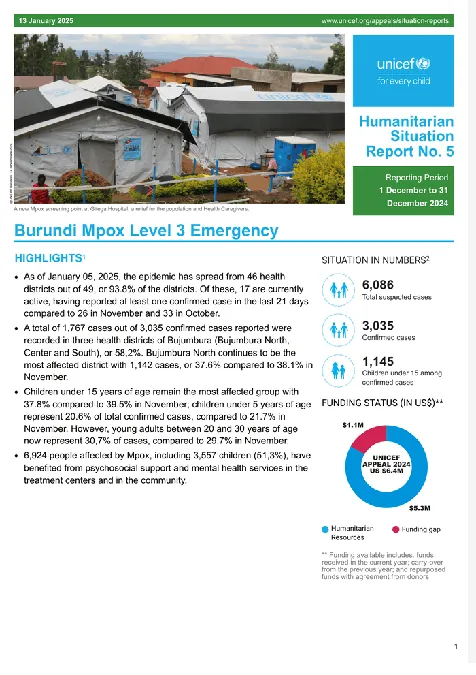
Urgent Update on Mpox Outbreak in Burundi: Alarming Trends and Ongoing Efforts
2025-01-13
Author: Ming
Urgent Update on Mpox Outbreak in Burundi: Alarming Trends and Ongoing Efforts
As we transition into 2025, Burundi is facing a critical public health crisis due to the Mpox outbreak that has swept through the nation. Current reports indicate that as of January 5, 2025, the epidemic has extended its reach into 46 out of 49 health districts, marking a staggering 93.8% of the nation's territories affected. While the overall number of active cases has decreased recently, the threat remains significant, particularly for vulnerable populations.
Key Statistics Highlighting the Crisis
Interestingly, recent data reveals a decline in the number of active health districts reporting confirmed cases, which dropped from 26 in November to 17 in December. Yet, the total confirmed cases have risen to 3,035, with Bujumbura, particularly the North district, being the hardest hit. This district alone accounts for 1,142 cases, constituting 37.6% of all confirmed cases in Burundi.
The demographic impact is particularly concerning, with children under 15 years still representing the most affected group—37.8% of total confirmed cases. Alarmingly, children under the age of 5 account for 20.6% of these cases. Meanwhile, young adults aged 20 to 30 have seen a slight uptick, now reflecting 30.8% of total cases, highlighting a troubling trend of the disease affecting a wider age range.
Psychosocial Support Initiatives
In response to the escalating crisis, UNICEF has been proactive in delivering psychosocial support and mental health services to those affected by Mpox. To date, 6,924 individuals have accessed these vital services, including a significant 3,557 children—representing over half of those assisted. These initiatives are crucial in helping families cope with the emotional toll of the epidemic.
Ongoing Health Interventions
The Government of Burundi officially declared the Mpox outbreak on July 25, 2024, after identifying three cases. The situation prompted UNICEF to elevate the emergency response to Level 3, aimed at mobilizing resources and support on an urgent basis. This emergency classification has been extended until February 19, 2025, reflecting the continuous need for vigilance.
Despite some hopeful declines in case numbers and a drop in reporting health districts, the overall epidemiological landscape remains concerning. The hotspots initially identified—Bujumbura Nord, Centre, Sud, Gitega, Isare, and Kayanza—continue to experience the highest case loads.
The Road Ahead
As we look forward, local health authorities and international organizations are poised to enhance their response strategies. This includes not just managing current cases, but also focusing on vaccination campaigns and community education to slow the spread of the virus. The fight against Mpox in Burundi is far from over, and ongoing support from global health partners will be essential in achieving stability and recovery.
Stay tuned for updates as we continue to track this evolving health emergency. The people of Burundi deserve our solidarity and support as they navigate this challenging time.




 Brasil (PT)
Brasil (PT)
 Canada (EN)
Canada (EN)
 Chile (ES)
Chile (ES)
 Česko (CS)
Česko (CS)
 대한민국 (KO)
대한민국 (KO)
 España (ES)
España (ES)
 France (FR)
France (FR)
 Hong Kong (EN)
Hong Kong (EN)
 Italia (IT)
Italia (IT)
 日本 (JA)
日本 (JA)
 Magyarország (HU)
Magyarország (HU)
 Norge (NO)
Norge (NO)
 Polska (PL)
Polska (PL)
 Schweiz (DE)
Schweiz (DE)
 Singapore (EN)
Singapore (EN)
 Sverige (SV)
Sverige (SV)
 Suomi (FI)
Suomi (FI)
 Türkiye (TR)
Türkiye (TR)
 الإمارات العربية المتحدة (AR)
الإمارات العربية المتحدة (AR)